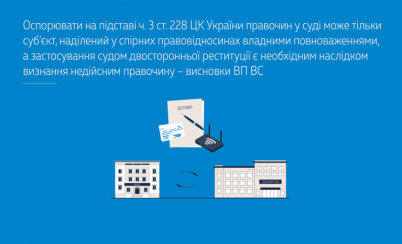Contact center of the Ukrainian Judiciary 044 207-35-46

In case of invalidation of a transaction, when satisfying a party's claim for the return of property transferred under an invalid transaction, the court must also order the plaintiff to recover the funds received under the transaction in favour of the defendant (return the transferred property). Such recovery is not the satisfaction of a separate claim, but is a necessary consequence of the invalidation of the transaction and the satisfaction of the restitution claim.
These legal conclusions were made by the Grand Chamber of the Supreme Court in a case brought by a lyceum against a company seeking to invalidate a contract for the supply of network equipment and recover funds.
In this case, the parties entered into a contract for the supply of network equipment to provide access to the Internet, under which the company (supplier) supplied the lyceum (customer) with network equipment, and the customer accepted and paid for the goods. At the same time, the plaintiff learned that the company had sold the goods at significantly inflated prices. Since the goods under the contract were purchased with public funds, the plaintiff believes that the transaction is contrary to the interests of the state and society and should be declared invalid and the money paid for it should be recovered from the company.
In upholding the claim, the courts of previous instances stated that the agreement did not comply with Articles 203 and 228 of the Civil Code of Ukraine, as it was made for a purpose contrary to the interests of the state, with the company's intent to do so.
After considering the case, the Grand Chamber of the Supreme Court disagreed with the conclusions of the lower courts that there were grounds for invalidating the agreement in accordance with the provisions of part 3 of Article 228 of the Civil Code of Ukraine due to non-compliance with the requirements for compatibility of the terms of this transaction with the interests of the state.
The Grand Chamber of the Supreme Court concluded that the determination of what constitutes or may constitute a violation of the state's interests and the challenge of a transaction in court on the basis of part 3 of Article 228 of the Civil Code of Ukraine may be made only by a person who has authority over the disputed legal relationship (regardless of the status of the legal entity) or by a prosecutor who, in accordance with the established procedure and performing a subsidiary role, may represent the state in court proceedings instead of the relevant competent body which, contrary to the requirements of the law, fails to protect the state's interests or does so improperly.
At the same time, the lyceum does not perform public administration functions, is not a public authority and therefore does not have the authority to file a lawsuit in the interest of the state.
With regard to the annulment of the contract under Article 203 of the Civil Code of Ukraine, the Grand Chamber of the Supreme Court found that the company had not substantiated the grounds for reviewing and overturning the decisions of the lower courts in this part. However, there are grounds for changing the challenged court decisions regarding the application of the consequences of the invalidity of the contract.
In particular, the Grand Chamber of the Supreme Court stated that in the event of the invalidity of a transaction, the mutual return by the parties of what they received under the transaction (bilateral restitution) is a legal obligation arising from the law and the legal fact of the invalidity of the transaction.
In this category of cases, the court, when satisfying a party's claim for the return of property transferred under an invalid transaction, must also order the plaintiff to recover the funds received under the transaction in favour of the defendant (return the property transferred by the plaintiff). Such recovery is not the satisfaction of a separate claim, but is a necessary consequence of the invalidation of the transaction and the satisfaction of the restitution claim.
Therefore, a literal interpretation of Article 216 of the Civil Code of Ukraine leads to the conclusion that, unless the law establishes special conditions for the application of the legal consequences of an invalid transaction or special legal consequences of certain types of invalid transactions, a plaintiff who claims the return in kind of what was transferred under an invalid transaction or the reimbursement of the value of the transferred property makes a claim for restitution, which the court, if there are grounds for doing so, satisfies by applying bilateral restitution. In this case, the defendant is the recoverer in terms of the decision to return the property transferred to him under the invalid transaction or to reimburse the value.
Since the courts had established the circumstances of the parties' performance of the contract, the SC GC concluded that, in satisfying the lyceum's claims, the courts should also have returned the property transferred under the contract from the lyceum to the company, i.e. applied bilateral restitution as a necessary consequence of nullifying the contract and satisfying the lyceum's restitution claim.
Resolution of the Grand Chamber of the Supreme Court of 18 September 2024 in case No. 918/1043/21 (proceedings No. 12-35гс23) - https://reyestr.court.gov.ua/Review/121753942.
This and other legal opinions of the Supreme Court are available in the Database of Legal Positions of the Supreme Court - https://lpd.court.gov.ua.